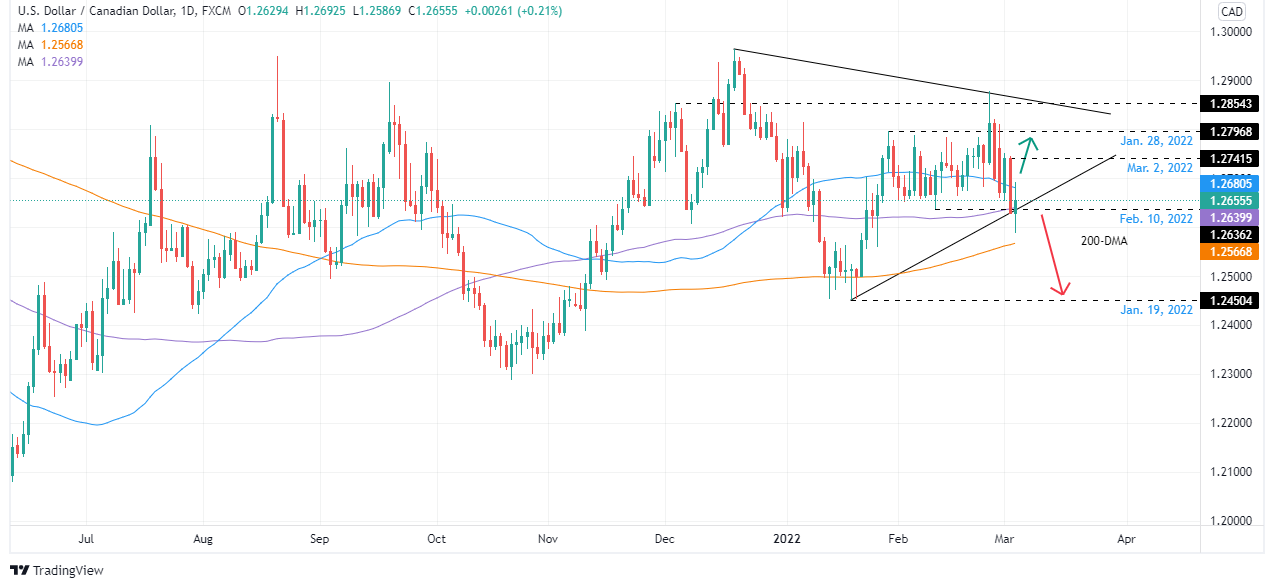- Analytics
- News and Tools
- Market News
- USD/CAD Price Analysis: Trades within DMAs as bears regain control in the short term
USD/CAD Price Analysis: Trades within DMAs as bears regain control in the short term
- The USD/CAD pairs some Wednesday’s losses, though struggles to reclaim the 50-DMA, which could spur a leg-down.
- Negative market sentiment, keep safe-haven peers buoyant.
- USD/CAD Technical Outlook: Neutral biased but could turn neutral-downwards if USD/CAD bulls struggle at 1.2680, 50-DMA.
Trapped between the 50 and 100-day moving averages (DMAs) after a steeper loss on Wednesday while the Bank of Canada (BoC) hiked 25 basis points to its Bank Rate to 0.50%, the USD/CAD edges higher. At the time of writing, the USD/CAD is trading at 1.2661, 40-pips short of the 1.2700 mark.
Geopolitical headlines hit the financial markets again. While Russia-Ukraine held the second round of talks in Belarus, the Ukrainian military reported that Belarus troops received the order to cross the Ukrainian border. Said that the market mood still dampened as witnessed in global equities. The CAD weakened against safe-haven peers amid rising US crude oil prices cling to the $110 mark.
The Bank of Canada Governor Macklem crosses the wires at press time, and you can follow the coverage here.
USD/CAD Price Forecast: Technical outlook
The USD/CAD bias is neutral, but it could be “neutral-downwards.” Why? Because on March 2 recorded a daily close below February 10 low at 1.2632, breaking the previous market structure; nevertheless, on Thursday, the USD/CAD recovered but is struggling to break above the 50-DMA at 1.2680.
USD/CAD’s failure at the 50-DMA would allow further losses. The pair’s first support would be the confluence of the 100-DMA and February 10 daily low in the 1.2632-40 area. Breach of the latter would expose March 3 daily low at 1.2587, followed by the 200-DMA at 1.2567, and ultimately would reach January 19 low at 1.2450.
If the scenario of the USD/CAD reclaiming the 50-DMA, the first resistance would be 1.2700. Once cleared, the next ceiling level would be March 2 high at 1,2741, followed by January 22 high at 1.2797 and a three-month-old downslope trendline around 1.280030.

© 2000-2026. All rights reserved.
This site is managed by Teletrade D.J. LLC 2351 LLC 2022 (Euro House, Richmond Hill Road, Kingstown, VC0100, St. Vincent and the Grenadines).
The information on this website is for informational purposes only and does not constitute any investment advice.
The company does not serve or provide services to customers who are residents of the US, Canada, Iran, The Democratic People's Republic of Korea, Yemen and FATF blacklisted countries.
Making transactions on financial markets with marginal financial instruments opens up wide possibilities and allows investors who are willing to take risks to earn high profits, carrying a potentially high risk of losses at the same time. Therefore you should responsibly approach the issue of choosing the appropriate investment strategy, taking the available resources into account, before starting trading.
Use of the information: full or partial use of materials from this website must always be referenced to TeleTrade as the source of information. Use of the materials on the Internet must be accompanied by a hyperlink to teletrade.org. Automatic import of materials and information from this website is prohibited.
Please contact our PR department if you have any questions or need assistance at pr@teletrade.global.















